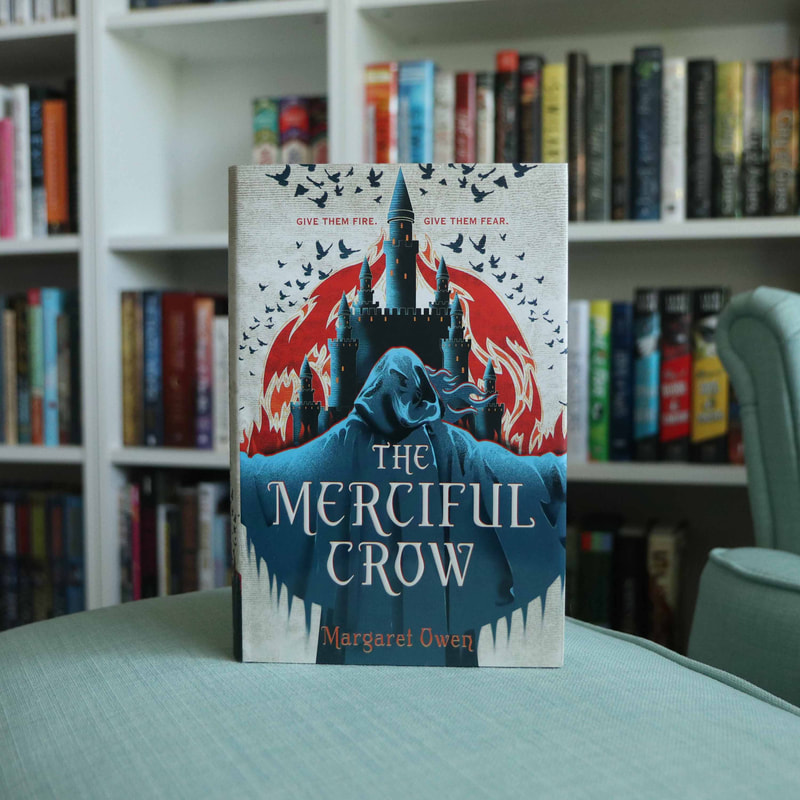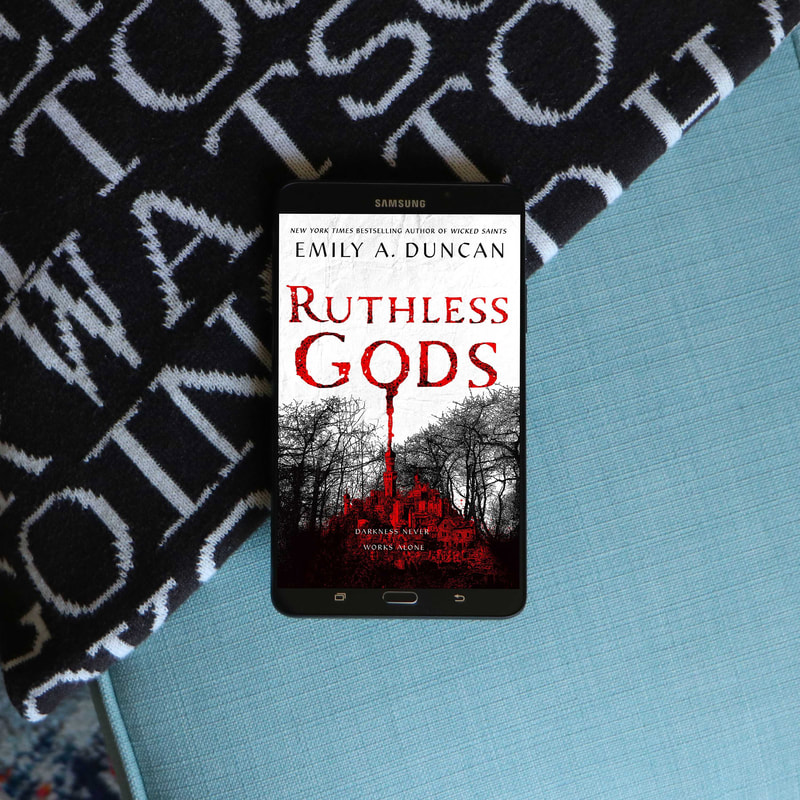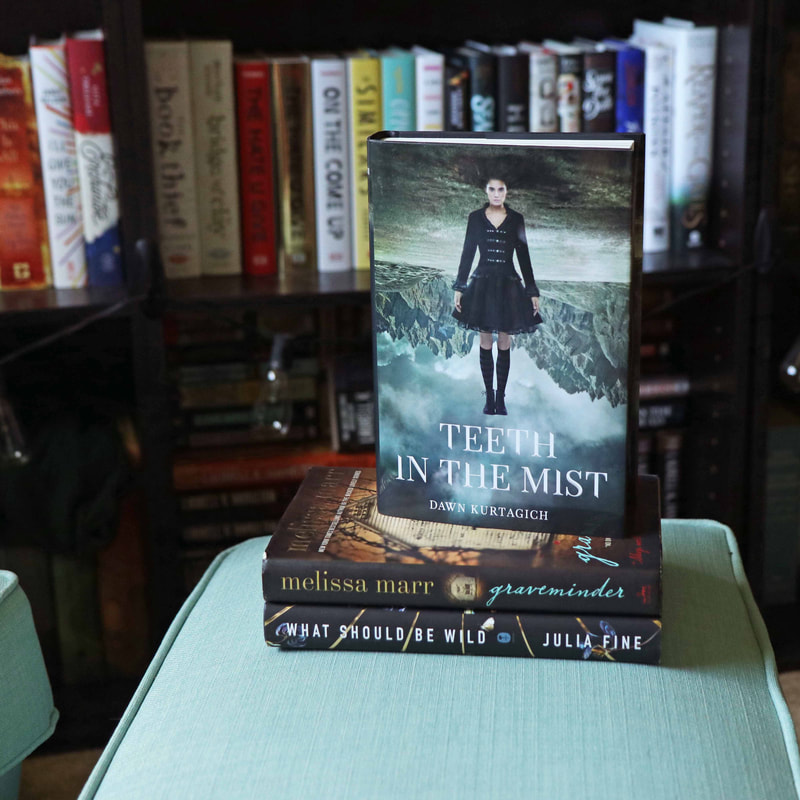|
4.5 stars
So this is apparently an odd opinion... but this really, really worked for me. (I think half of that reasoning is because of the teeth.) Concept: ★★★★ Twist on YA tropes: ★★★★★ Surprise factor: ★★★★ Enjoyment: ★★★★★ A mini rant: It's times like these where I really, really wish Six of Crows wasn't such a YA titan that is universally—and sometimes violently—loved. I don't mean ANY disrespect for fans of the duology as I am a fan myself, but I think that The Merciful Crow was prematurely dismissed by some in the YA community for its title, and the mere fact that it had to do with a caste of people called "Crows." Which is nuts, as this book was not even the same thing, at all. Fie is a Crow, a chief-in-training, and she travels with other Crows from town to town. They are the lepers, the bottom caste, the forced nomads, the ones that everyone else can use and abuse. But the Crows have one thing that the other bird castes of the land do not—they are the only ones who are immune from the Plague. When someone gets the plague, the smoke is lit, and the Crows come calling. They take care of the sick and dying and they honor the dead. The land may mock them, hurt them, and execute them, but when the people become ill it is the Crows to whom they beg. And the Crows always come, and they always show mercy. The world of The Merciful Crow is divided into several bird castes. This is not a shape shifting novel—there are no actual birds involved. But each caste of bird is a different social class, and each caste has their own Birthright magic, which displays in some of their castes' witches. It's an intriguing finesse of some standard fantasy decisions, and if that was the only twist on this story's magic, I would have been disappointed. But it wasn't—there are also the teeth. Fie and the other Crow chiefs have a special way with teeth and bones. But specifically, teeth. When Fie touches a tooth, she knows the life of its owner and can call on the innate Birthright magic of the tooth for her own use. So, in essence, if Fie is holding the right tooth.... she can use any of the realm's powers at her disposal. The Crows are ignored by everyone else, so this power goes relatively unnoticed by the other castes...at their own peril. [Example: The Sparrow caste witches are able to direct or deflect attention, so if Fie is hiding from someone all she needs is to wake up the magic of a Sparrow tooth to hide herself from view.] Fie's life changes forever when one day, her chief decides to save the royal Phoenix son of the crown. The prince and his bodyguard are on the run from the prince's stepmother, the Queen, who's out to kill him and take the throne for her own. The Crows are trapped—if they don't help the prince, then the Queen will punish and kill the Crows for their involvement. If they help the prince, then its up to the Crows to avoid the punishment of the Queen while also trying to get the prince to his allies... and once they've finished their usefulness, they are forced back to their life of abuse and uncertainty. It's a lose-lose situation for the Crows, and they know it. But Fie refuses to accept the terms, and she draws an oath from the prince: if the Crows do this, they deserve a seat at the table. They want to protected and respected. No more murders, no more abuse. To her surprise, the prince and his bodyguard agree. Now they just need to get him to safety. Things I loved: The focus on the plague. I'm a morbid historian at heart, and this focus was great—it has its roots in the Black Death's plague doctors (complete with their masks, etc.) but there are also other elements in there too. I also loved (wrong word choice given the negative connotations...) the parallels between what happens to the Crows on the road with the dark American history of the KKK raids in the South—the parallels are intentional, and well done. Also, THE TEETH. Great magical element, thoroughly enjoyed its integration and how it was used consistently throughout the novel. Really nice, really unique, made it memorable. Things I didn't love: How short this was. I would have gladly read a novel twice this length.
0 Comments
4.5 stars
Considering the fact that I hated the beginning of this, no one is more shocked than me that this is a damn good book. First 100 pages: ★ Plot: ★★★★★ Character development: ★★★★★ This is the second book in a series, so if you don't want to be spoiled for Wicked Saints, please check out that book first! (My review of it here.) Wicked Saints was a surprisingly polarizing read in 2019, and I think Ruthless Gods will be similar—if not for the same reasons. Ruthless Gods, in my opinion, is LEAGUES better than the first novel, but only if you can pass through the first 100 pages of extremely vague writing, frustrating lack of explanation, and several wham-bam 180 degree flips that completely switch many things up. THIS REVIEW WILL, OUT OF NECESSITY, SPOIL WICKED SAINTS. I'M SERIOUS, PLEASE STOP IF YOU DON'T WANT TO BE SPOILED. Nadya, Malachiasz, and Serefin are all having a bad time at the beginning of this book as the end of Wicked Saints left us with a LOT to unpack. Nadya's gods have left her and she's broken many of her homeland's laws to save the enemy. Malachiasz's last-minute betrayals left him with the powers of a god, but no way to keep his sanity and control them. Serefin was literally murdered and brought back to life, and now a god is whispering bad things in his ear. Oh, and the gods we thought were scary in the first novel aren't even the ones we need to worry about. Now, like I said above, the first 100 pages of this novel were ROUGH. We're talking, I was so frustrated I thought someone else had wrote this, rough. Considering it takes places very close to the ending of Wicked Saints, I was surprised to find the first bit of this book lagged. It seemed like an odd form of a holding pattern, as not much happened and yet lots was happening, and we were still primarily doing odd character-building scenes that also altered previous facts. I think all of the alterations were positive and made the plot stronger...but wish that they had been either included in the first book or brought to us later, because I was making audible frustrated gripes when the witch, Poletga (spelling is butchered, sorry) gave us these vague nothings over and over with each of our characters. But, as you can see from my 5 star rating, this was a damn good book. I loved that it kept me on my toes, and the additions to the plot were exciting and made the story more original than I gave it credit for in Wicked Saints. In particular, I hope we see more of the Akolan politics in the third book, as it did give this fantasy world a fresh burst of diversity. AND I hope we continue to keep up the pace with this incredibly dark, mythic approach to old gods that really cemented itself in this installment. It's unflinchingly bloody, twisted, darkly sensual, unrepentant, and surprising. I loved it. Thank you to Wednesday Books via NetGalley for an ARC of this title in exchange for an honest review. 2.5 stars
This review is going to be such a bummer, because I was so freaking pumped for this and love this author's previous books. Concept: ★★★★ Plot/Logic: ★★ Enjoyment: ★ This is a reaction review. Given my conflicting and confused thoughts on this novel, I highly recommend checking out the official listings for a more concise summary. Normally I do those myself for these reviews, but I don't think I could do it justice here given my confusion. Teeth in the Mist was a book that I was very excited to read. We've got 3 different timelines of women all tied to this ancient mill house in the remote UK (England? Scotland? Unclear.) There's a demonic angle, and in amazing Kurtagich style there were a bunch of documents and stylistic text choices throughout. For example, the modern girl's narrative takes place almost exclusively through journal entries and camera transcripts. The 1800s timeline takes place in traditional 3rd person narration, and the oldest timeline takes place as very small diary entries. But this was a mess for me. For the first third, I was completely, utterly, 100% confused. And that was okay! I kept going, because I trusted that the story would become more clear as we went on. It did, and it didn't. Aside from complete confusion for the entire reading experience—and not the good kind, the frustrating "why are you giving me nothing" kind—I was also continually frustrated with the way that these three timelines were portrayed, and the lack of world building and character development used in each of them. This was a HUGE case of telling, not showing, and what we were told varied by the minute and was almost useless in most cases. I just can't emphasize enough how much this book relied on telling, not showing. In particular, there is one element of the story that is obvious from the start (which wasn't a problem!) and then in the context of plot progression that trope completely goes off the rails. Please see my Goodreads review to view that spoiler. On top of the spoiler above, it was just... why? The entire time I was reading the second half of this book—when it became clear where we were going with the three plot lines—I kept thinking, there must be more. Otherwise, why? Where is the payoff? Where is the satisfying "Ah, this is why I slogged through this" ending? It just... didn't satisfy. And it wasn't necessary to have three timelines, so I was frustrated by that element as well. As you can tell, I'm pretty heated on the topic. Please take my opinions as their own, and not a reflection on anyone else's reading experience. This was a 400 page book of ?!?!?!, and it ended that way. But I still love this author, and I stand by Dead House, her previous book. Looking forward to the next one. |
Amy Imogene ReadsJust someone looking for her own door into Wonderland. Categories
All
Archives
March 2024
|




 RSS Feed
RSS Feed
